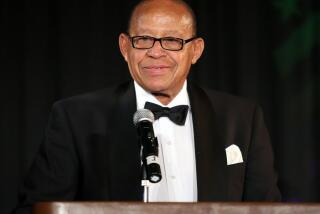Jack Jones dies at 86; former longtime Los Angeles Times reporter
- Share via
Jack Jones, a longtime Los Angeles Times reporter who was part of a team that shared the 1966 Pulitzer Prize for the newspaper’s coverage of the Watts riots and their aftermath, has died. He was 86.
Jones, who retired in 1989, died of lung disease Thursday at his Oceanside home, said his wife, Brie.
The Times received the Pulitzer for local reporting for its coverage of the several days of bloodshed and destruction during the Watts riots in August 1965 and for a follow-up series that ran the following October.
When order was restored, Times reporters returned to the community to gauge “The View From Watts,” a series of several articles that ran under Jones’ byline.
He was an “an ace rewrite man,” recalled colleagues who knew him, and he had helped pull together the reporting of dozens of staff members who had been deployed to cover the riots.
“Jack Jones was a reporter with a real social conscience, and he felt a deep obligation to the poor people he was covering,” said Bill Boyarsky, a former Times city editor and columnist. “He just pursued it because it was the right thing to do.”
Toward the end of Jones’ 35-year career with the newspaper, he helped found The Times’ San Diego edition.
Jones also wrote mass-market novels that included “Journey Into Death” (1956), “The Animal” (1975) and “Baja” (1984).
He was born John E. Jones Jr. in El Paso on June 14, 1924.
As a young child, he lived in Mexico while his father was in the consular service and moved to Riverside with his family when he was about 13.
During the latter part of World War II, Jones served in the Navy’s amphibious forces.
After leaving the military in 1946, he earned a bachelor’s degree in journalism in 1949 at USC and started his career as a copy boy at the Los Angeles Daily News.
The Daily News folded on a Saturday in late 1954, and he came to work for The Times the following Monday, Jones later recalled.
Jones was divorced from his first wife, and his second wedding was given an unexpected Hollywood assist when he married Brie, an actress, in the early 1950s at the Little Brown Church of the Valley.
Billed as Barbara Stewart, Brie had appeared on the TV series “Dragnet” with Jack Webb. When she told Webb that she had just returned from performing for the military in Europe, he insisted on paying for the Stewart-Jones wedding, she recalled, despite being unhappy with an article that Jones had written about “Dragnet.”
In addition to his wife, Jones is survived by a son, Scott, a lawyer in Tokyo; and a grandson.
More to Read
Start your day right
Sign up for Essential California for the L.A. Times biggest news, features and recommendations in your inbox six days a week.
You may occasionally receive promotional content from the Los Angeles Times.





















































